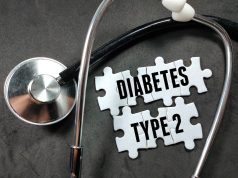GLP-1 RAs linked to lower risk among those with type 2 diabetes and without diabetes; greater protection seen versus metformin, insulin
By Elana Gotkine HealthDay Reporter
TUESDAY, Sept. 2, 2025 (HealthDay News) — Glucagon-like peptide 1 receptor agonists (GLP-1 RAs) are associated with a reduction in the risk for developing uveitis, according to a study published online Aug. 28 in JAMA Ophthalmology.
Nitesh Mohan, from the Cole Eye Institute at the Cleveland Clinic, and colleagues examined whether being prescribed a GLP-1 RA is associated with a reduced risk for developing uveitis in a retrospective cohort study using electronic health record network data from 2006 to 2025.
The study included 516,052 patients: 258,026 in the GLP-1 RA group and 258,026 in the propensity score-matched control group. The researchers found that compared with controls, the GLP-1 RA cohort had a reduced risk for uveitis (risk ratio, 0.48), which was consistent among those with type 2 diabetes and without diabetes (risk ratios, 0.54 and 0.52, respectively). GLP-1 RA prescriptions were associated with greater protection against uveitis compared with the cohorts taking metformin and insulin (risk ratios, 0.58 and 0.57, respectively). Compared with those taking sodium-glucose cotransporter 2 inhibitors (SGLT2is), patients taking GLP-1 RAs had a slightly increased uveitis risk (risk ratio, 1.17); SGLT2i prescriptions were associated with a reduced risk for uveitis compared with controls (risk ratio, 0.52).
“This is the first study to find a protective effect of GLP-1 RA therapy for autoimmune disease, which is very exciting and shows a further benefit of these drugs for patients beyond just weight loss and control of diabetes,” senior study author Sumit Sharma, M.D., also from the Cleveland Clinic Cole Eye Institute, said in a statement.
Several authors disclosed ties to the biopharmaceutical and medical device industries.
Editorial (subscription or payment may be required)
Copyright © 2025 HealthDay. All rights reserved.








